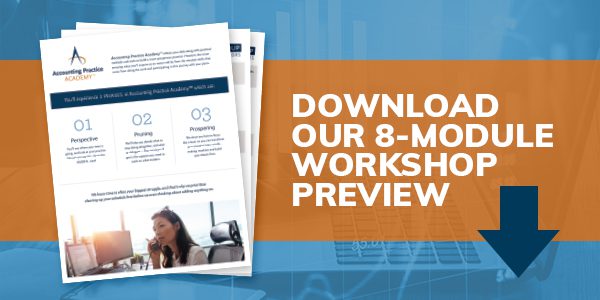Finding the right accounting practice to buy has a lot of great advantages…as long as you buy one that reasonably fits you. I say reasonably, because you will never find the “perfect” practice. After all, if you build a practice from scratch it will also have flaws. Without a doubt, acquiring a well-established practice can minimize the struggle to become a successful practitioner. It can expedite the process considerably because it immediately gives you a reliable revenue stream.
Below are 7 key areas to focus on when initially evaluating an accounting practice to buy:
Focus on clients:
Who is your ideal client? Are you likely to be able to connect with these clients? Let’s assume for a moment that you have the technical competence to create value for these clients. Can you relate to them? Would they be enjoyable to work with? Look at their income, industries and ages. The first indication will be how well you relate to the seller. A good cultural fit with the seller is a very positive early sign.
Focus on trust:
Do you trust the seller? This is really simple. No trust, no business. Take some time to develop rapport with the seller and take note of your first impressions.
Background of seller:
What is the professional background of the seller? Big firm, small firm, corporate? This will help you understand his/her skillset better. This background inevitably will show up in various ways throughout the practice. For example, a CPA with a heavy corporate background may do more strategic consulting with clients while a CPA with a big firm background may have very structured/organized files.
Management style/ability:
How many staff does the firm have? Have you managed people before? How does the seller manage his/her people? Would the style be described as structured or flexible? All owners manage people differently and perhaps your management style would be better, but it’s important to understand the relationships the seller has with staff. This can help you spot several things such as: competitive threats, hiring and firing needs, as well as strengths to build upon.
Technical Ability:
Know the key revenue streams of the practice. If there are smaller areas where you do not have mastery it may not be a problem, but if the practice focuses on areas that are problematic for you, then the practice may not be right for you.
Risks:
Know the key risk areas when buying a practice. The most common risks we see are:
- Very large clients-If large clients represent a large percentage of firm revenues, then this can pose a risk that you will want to mitigate with the purchase structure.
- Competitive threats-With the seller and potentially with staff.
- Transition-poorly executed transitions are probably the biggest threat. Early communications with staff and clients are crucial. A proactive, confident approach fuels success.
Potential:
Many buyers focus on all the risks of buying that they forget to consider and plan for the opportunities. Most of the potential for growth comes from your own abilities and talents. A lot of buyers we see have something retiring owners typically don’t have – ENERGY. The best thing you can do as a buyer is know your own strengths and weaknesses and put your energy in the right places. You need to find a practice that can capitalize on your own strengths. Significant growth can often be accomplished simply by creating more value for existing clients. Couple that with improvements in pricing strategies and efficiency, and the practice’s cash flow can be significantly and rapidly improved.
I’ll close with a quote:
“It’s far better to buy a wonderful company at a fair price than a fair company at a wonderful price.”
Warren Buffett







